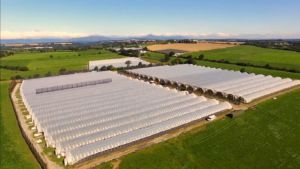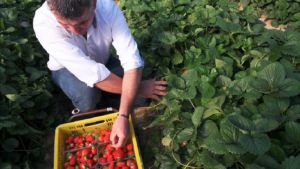What does it take to run an Irish fruit farm that’s one and a half times the size of Croke Park?
Just over a decade ago, Greenhill Fruit Farm was set up by dairy and fresh fruit farmer, Eamonn Crean in Davidstown, Enniscorthy, Co. Wexford. The fruit plantations of strawberries, raspberries and blackberries have a footprint of almost one and a half times the size of Croke Park, comprising of twenty-four acres of polytunnel fruit with a staff of up to 150 during the peak summer season. Eamonn recalls how it all began and shares the challenges and lessons he has learned along the way. He retails to supermarkets, hotels, restaurants and to all essential agricultural shows. He also sells directly to consumers across the country via a network of roadside stands – where consumer feedback is the vital food of champions.
“The trade in fresh Irish strawberries has grown significantly to over 7,700 tonnes per year.”
What motivated you to start the business?
In 1990 after finishing secondary school, I worked on the family farm, milking 120 cows along with my brother John and dad Edmund. My mother’s family had a tradition of growing strawberries under contract for jam production which was the primary market outlet back then. EU milk quotas were in place, and the option of expanding the home dairy herd was limited, and so I began looking around for alternatives to help create additional income for myself and the family farm. At that time, I could see that the market for Wexford strawberries appeared to be shifting from jam to fresh fruit and unfortunately since then, the demand for jam production has collapsed, along with grower numbers. In spite of this decline, the trade in Irish strawberries for fresh fruit production has grown significantly to over 7,700 tonnes per year. Ultimately the production of fresh fruit has become more commercial and specialised. For the grower, it can be a rewarding but robust industry combined with its own unique set of production and marketing challenges.
“Irish growers deliberately seek out varieties that sustain flavour.”
Starting out
In the early 90s, I started out by buying fresh fruit from local strawberry growers, for resale at the weekends. Over time I organised new road-side stands across the country in Dublin, Blessington, Kilkenny, the Midlands, Sligo and Cavan. I am pleased to say, that after almost thirty years later we still hold and trade with those outlets. In 2003, John and I planted three acres of strawberries between us, with the aim of achieving a more consistent product. We planted the strawberries in soil under small half-metre high polytunnels, and although the quality improved, poor weather conditions could still impact on consistency. By 2007, I had purchased some land, established my own dairy unit, milking sixty cows under existing quota rules and set up my private fresh fruit company, under the ‘Greenhill Fruit Farm’ brand. Since then we have transitioned to growing our fruit into much larger walk-in polytunnels.
“One of the most significant challenges we faced was, ‘Storm Emma’ when sixty-five of our tunnels collapsed in one night, damaging 50% of the farm.”
What’s your secret sauce?
On the farm, we still grow about half of our strawberries in the soil, in the traditional way, which from a commercial farming perspective is relatively unique. It’s an added attraction to the farm and makes a real difference to the quality of our fruit. The main reason is that roots that are grown directly in the ground are naturally colder, allowing the fruit to ripen more slowly, adding to the ultimate flavour.
A considerable part of our success has been roadside selling, which had been facilitated by government legislation back in the 90s. This has had a two-fold benefit, allowing us to scale and secondly to get our product directly to consumers with our own label on it. If people like your product, they tell you they like it – and if they don’t, they will let you know within thirty seconds; and for us, that direct feedback is precisely what we needed to know, to help create a good product. The important thing is to make the changes in time before you end up with a titanic situation on your hands.
In the South East of Ireland, we believe we also have an added advantage in having the optimum climate to produce a sweeter more flavoursome fruit. This in part is due to the number of daylight hours we receive. Along with that, Irish growers deliberately seek out varieties that sustain flavour – however, for the grower, more taste generally equals lower yield. Despite this, it makes more sense to try to create a sustainable business for the future, by providing a product that is in growing demand and that consumers want more of.
“It’s vital to be able to create a team who are willing to buy into the same idea or vision for the company.”
Challenges
There are so many variables and problems when growing fresh fruit, whether it’s competition from Dutch imports, paying the highest minimum wage in the EU and even accommodation costs. One of the most significant challenges we faced this March was, ‘Storm Emma’ when sixty-five of our tunnels collapsed in one night, damaging 50% of the farm. We had followed best practice and guidance and orientated the tunnels in an N-S direction to allow for the prevailing S-W wind. However, the snow came from the East and drifted, causing the tunnels to collapse. It took a hugely dedicated team to be able to come in and redo and fix the tunnels, and it’s a cost the farm will have to carry over the next few years. The workforce is becoming the lifeline of a farm, and it’s becoming more difficult to recruit – especially as most European countries are coming out of recession. Labour costs are at 50% of sales, and top pickers can earn up to €14-16/hr – however, because it’s a six month picking season, working in the industry is not viewed as a long-term career.
Nevertheless, it’s a growing industry with fresh fruit seen as a very healthy food option. We have also had great help in receiving training and grants from both local and national agencies such as Leader, Teagasc and the DAFM, combined with valued support from Bank of Ireland, grower organisations, Wexford Food Family, Irish consumers as well as wholesale buyers – and long may that continue.
“The workforce is becoming the lifeline of a farm, and it’s becoming more difficult to recruit.”
What tips would you like to share with fellow entrepreneurs?
Our excellent senior managers and supervisors who come from Romania and Bulgaria are crucial to running a successful operation and are backed up by a fantastic group of picking, logistic, sales and office staff. As a commercial grower and like a lot of other businesses, it’s vital to be able to create a team who are willing to buy into the same idea or vision for the company and secondly to ensure that you can achieve sufficient turnover to both sustain that team and help develop the business into the future.
The main image is of the Crean family, from left: Sadbh, Dierdre, Edmund, Aoibhinn, Abigail, Eamon Mairead and Annalise Crean. Photo by Mary Browne.
Interview by Brendan Byrne
This post was originally published here - https://www.thinkbusiness.ie/articles/greenhill-fruit-farm-wexford-ireland/ on
























